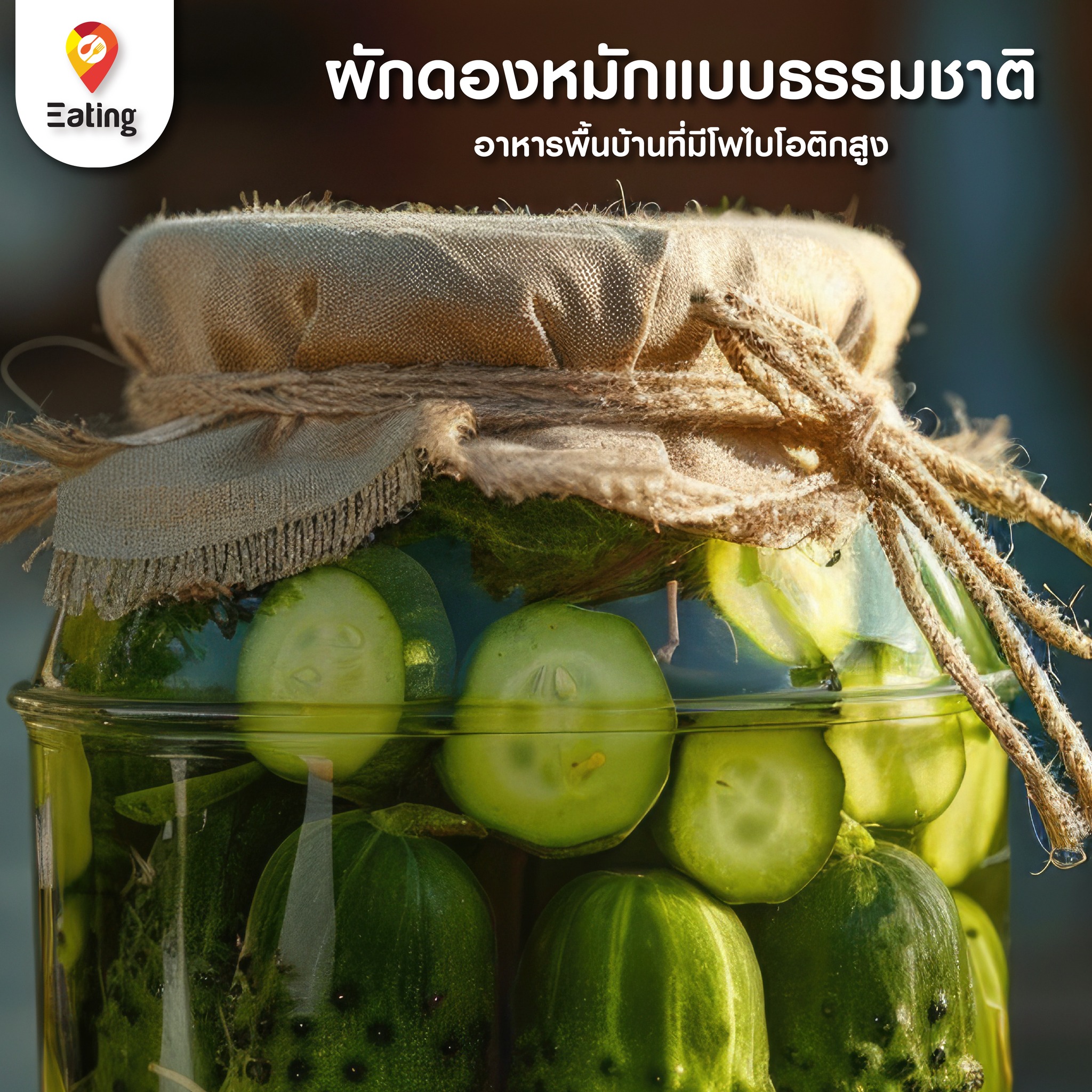Insider
New Experience

ผักดองหมัก
แบบธรรมชาติ อาหารพื้นบ้านที่มีโพไบโอติกสูง
ผักดองหมักแบบธรรมชาติเป็นหนึ่งในภูมิปัญญาพื้นบ้านที่สะท้อนให้เห็นถึงความเรียบง่ายและลึกซึ้งของวัฒนธรรมการกินอยู่ของไทยและหลายชนชาติในเอเชีย ไม่เพียงแต่เป็นวิธีถนอมอาหารที่ใช้กันมาตั้งแต่โบราณ แต่ยังกลายเป็นแหล่งของจุลินทรีย์ที่มีประโยชน์ หรือที่เราเรียกว่า “โพไบโอติก” โดยแทบไม่ต้องพึ่งสารเคมีหรือเทคโนโลยีสมัยใหม่เลย
.
ผักดองหมักแบบธรรมชาติมักใช้วิธีการหมักด้วยเกลือและน้ำสะอาด โดยอาศัยแบคทีเรียตามธรรมชาติที่มีอยู่บนผักหรือในสภาพแวดล้อมในการทำหน้าที่ย่อยสลายคาร์โบไฮเดรตในผักให้กลายเป็นกรดแลกติก ซึ่งเป็นกรดอินทรีย์ที่ช่วยยับยั้งการเติบโตของแบคทีเรียที่เป็นอันตราย และในขณะเดียวกันก็ช่วยให้ร่างกายได้รับแบคทีเรียดีที่ช่วยเสริมสุขภาพลำไส้
.
หนึ่งในผักดองที่คนไทยคุ้นเคยกันดีคือ “ผักเสี้ยนดอง” ซึ่งมักเห็นตามร้านขายข้าวมันไก่หรืออาหารพื้นบ้านทั่วไป โดยนำผักเสี้ยนมาล้างให้สะอาด หั่นเป็นชิ้น แล้วหมักในน้ำเกลือทิ้งไว้ 2-3 วัน บางสูตรอาจเติมข้าวสุกลงไปเล็กน้อยเพื่อเร่งกระบวนการหมัก เพราะแป้งจากข้าวจะกลายเป็นแหล่งอาหารของจุลินทรีย์ แล้วยังได้รสเปรี้ยวตามธรรมชาติที่ไม่ใช่แค่ความอร่อย แต่ยังดีต่อสุขภาพอีกด้วย
.
นอกจากผักเสี้ยนแล้ว ยังมีผักกาดดอง กะหล่ำปลีดอง และมะละกอดองที่สามารถหมักด้วยวิธีธรรมชาติได้เช่นกัน ซึ่งทุกชนิดนั้นล้วนเป็นแหล่งโพไบโอติกธรรมชาติที่ดี โดยเฉพาะถ้าไม่มีการเติมน้ำส้มสายชูหรือสารกันเสียใด ๆ ลงไปในขั้นตอนการหมัก เพราะสารเหล่านี้อาจฆ่าแบคทีเรียดีที่เราต้องการได้
.
ผักดองพื้นบ้านเหล่านี้นอกจากจะกินคู่กับอาหารจานหลักแล้ว ยังสามารถนำมาประยุกต์เป็นเมนูใหม่ ๆ ได้ เช่น ยำผักดอง ผัดไข่กับผักดอง หรือแม้แต่กินเปล่า ๆ กับข้าวสวยร้อน ๆ ก็ช่วยเพิ่มรสชาติและกระตุ้นความอยากอาหารได้อย่างดีเยี่ยม สิ่งสำคัญคือผักดองหมักธรรมชาติไม่ใช่แค่ของแกล้ม แต่ยังเป็นอาหารเพื่อสุขภาพอย่างแท้จริง
.
ในยุคที่คนเริ่มหันมาสนใจสุขภาพมากขึ้น การฟื้นคืนอาหารพื้นบ้านเหล่านี้กลับมาอีกครั้งจึงไม่ใช่แค่เรื่องของรสชาติ แต่ยังเป็นการส่งต่อมรดกวัฒนธรรมและภูมิปัญญาที่ช่วยให้ร่างกายแข็งแรงได้ด้วยธรรมชาติ ไม่ต้องพึ่งยา ไม่ต้องพึ่งอาหารเสริมใด ๆ แค่มีเกลือ น้ำ และเวลา ก็สร้างอาหารที่เต็มไปด้วยชีวิตให้กับลำไส้ของเราได้แล้ว
Naturally fermented pickled vegetables are one of the traditional folk wisdoms that reflect the simplicity and depth of food culture in Thailand and many other Asian countries. Not only have they served as a method of food preservation since ancient times, but they’ve also become a natural source of beneficial microorganisms—what we call “probiotics”—without the need for chemicals or modern technology.
This type of fermentation typically uses salt and clean water, relying on naturally occurring bacteria found on the vegetables or in the environment to break down carbohydrates into lactic acid. This organic acid helps inhibit the growth of harmful bacteria while promoting the growth of good bacteria that support gut health.
One of the most familiar Thai pickled vegetables is pickled Siam weed (pak sian dong), often served with dishes like Hainanese chicken rice or other local meals. The process involves washing and chopping the vegetable, then fermenting it in salt water for 2–3 days. Some recipes may add a bit of cooked rice to speed up fermentation, as the starch feeds the microbes. This results in a natural sourness that’s not just tasty but also health-boosting.
Aside from Siam weed, other vegetables like mustard greens, cabbage, and papaya can also be naturally pickled using the same method. These are all great sources of natural probiotics—especially when no vinegar or preservatives are added, as such additives can kill the beneficial bacteria we aim to cultivate.
These traditional pickled vegetables can be enjoyed as side dishes or adapted into new recipes like pickled veggie salads, stir-fried eggs with pickles, or simply eaten with hot steamed rice. Not only do they enhance flavor and stimulate appetite, but they also serve as genuinely healthful foods.
In an era where people are becoming more health-conscious, reviving these traditional foods isn’t just about taste—it’s about preserving cultural heritage and embracing natural wisdom that supports well-being. No medicine or supplements needed—just salt, water, and time are enough to create a living food that nourishes our gut.